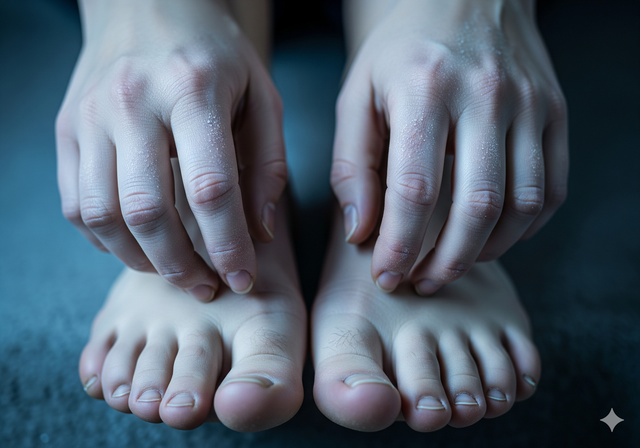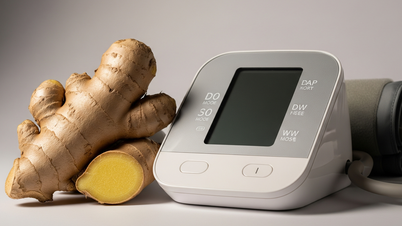According to Mr. Bhumesh Tyagi, an internist in India, the hands and feet are the parts farthest from the heart, so they easily recognize changes in blood circulation.
When the body focuses on keeping vital organs warm, the blood vessels in the limbs constrict, making them cold. If this happens frequently, it is not simply a matter of poor blood circulation but can be related to many underlying health causes, according to Onlymyhealth (India).

Cold hands and feet accompanied by symptoms such as numbness, tingling, skin color changes, dizziness..., the patient needs to see a doctor immediately.
Illustration: AI
Poor blood circulation
Prolonged sitting, lack of exercise, or cardiovascular disease can reduce blood flow to the hands and feet, leading to a persistent feeling of coldness.
This is a condition that many people encounter in modern life when office work makes the body less active.
Anemia
When the body lacks iron, the amount of oxygen in the blood decreases, resulting in tissues and organs not receiving enough energy.
People with anemia often feel cold hands and feet, and are easily tired and weak. This is a warning sign that many people often ignore.
Hypothyroidism
Hypothyroidism slows down your metabolism, reducing the amount of heat your body produces. Your hands and feet are often the first place you feel it.
People with this disease, in addition to cold hands and feet, may also feel tired, have unexplained weight gain, and dry skin.
Raynaud's syndrome
This is a condition that causes blood vessels to overreact to cold or stress. When you have this syndrome, your fingers and toes can turn white, blue, or purple, accompanied by numbness and tingling.
Raynaud's syndrome is more common in women and is more likely to recur during cold weather.
Diabetes
People with diabetes often experience poor blood circulation and peripheral nerve damage.
This results in a constant feeling of coldness in the hands and feet, which may even be accompanied by numbness, tingling, or loss of sensation.
Vitamin deficiency
A deficiency of vitamin B12, magnesium, or certain other nutrients can affect nerve function and circulation.
A body lacking essential vitamins will have difficulty regulating temperature and transmitting nerve signals, making cold hands and feet a frequent symptom.
Dr. Tyagi recommends that if cold hands and feet are accompanied by symptoms such as numbness, tingling, changes in skin color, dizziness or unusual weight gain or loss, the patient should seek medical attention immediately. This could be a sign of cardiovascular disease, metabolic disorders or more serious health problems. Early examination will help detect and treat promptly, avoiding unpredictable complications.
Source: https://thanhnien.vn/vi-sao-tay-chan-lanh-18525090311115248.htm


































































































Comment (0)